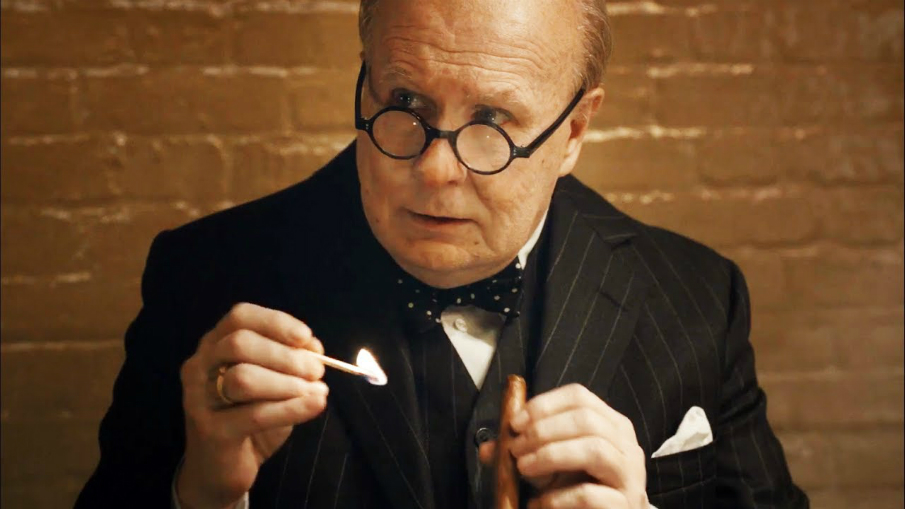“We shall defend our island whatever the cost may be! We shall fight on the beaches! We shall fight on the landing grounds! We shall fight in the fields and in the streets! We shall fight in the hills! We shall never surrender! For without victory, there can be no survival!”
Somewhere deep into Darkest Hour, Joe Wright’s new biopic about Winston Churchill and his standoff with the Nazi regime in 1940, I started to ponder over what it was trying to say, and who it was even intended for. The film gives the audience a crash course on the early days of Churchill’s reign as Britain’s prime minister and his hawkish stance on foreign affairs, in spite of opposition from his advisors. This is a well-documented part of history of which even those with a rudimentary understanding of World War II would be aware. If this were a docudrama filmed for television as an educational tool it would fulfill its purpose, for the most part. But the film barely goes beneath the surface level of Churchill’s speeches and known actions, so even those with a casual knowledge of the man would likely have a sense of knowing how this was going to end. That’s the tricky nature of biopics. When the audience already knows the ending, the juicy stuff comes from the journey, not the destination. In Darkest Hour we are left with a mostly accurate retelling of what happened, presented in a rather plain manner, without any gained insight one of modern history’s most famous leaders.
Darkest Hour begins with then British Prime Minister Neville Chamberlain (Ronald Pickup) resigning due to pressure over his lack of progress in finding peace with the Germans. This naturally leads to the strong-willed Churchill being appointed to the position, who then must then determine exactly what to do about Britain’s situation in the world. He meets with advisors and even King George (Ben Mendelsohn) himself, having many discussions about Churchill’s aggressive approach and how to properly navigate the Nazi regime without sacrificing too many of their men. Along the way we get to know Churchill’s personal habits through the film’s only proper female characters, his wife Clementine (Kristin Scott Thomas) and typist Elizabeth Layton (Lily James). The film leads up to Operation Dynamo, and Churchill’s famous “We shall fight on the beaches” speech to Parliament.
Of course, the big elephant in the room here, and perhaps the biggest part of the film’s appeal, is Gary Oldman. The slim veteran actor completely transforms himself to play Churchill, wearing heavy makeup, prosthetics and a hairpiece to accurately pull off the prime minister’s portly appearance. Beyond the physical disappearing act, which is expertly crafted, Oldman does convincingly pull off Churchill’s brazen temperament and acerbic wit that made him such a commanding force in every room he entered. The performance isn’t all fiery speeches as you might expect from the trailer, though. Even in those quieter scenes Oldman embodies Churchill, a stammered, unsteady line showing a moment of self-doubt before finding his confidence again. As we’ve seen throughout history, it is the kind of studied performance that wins you an Oscar. Whether he deserves the honor will come down to who he will be competing against in Best Actor, but a win would not shock me in the least.
It is unfortunate that the film itself does not quite live up to Oldman’s performance. Despite some creative flourishes from cinematographer Bruno Delbonnel there is a flatness to Darkest Hour that makes the film a comfortable sit but not exactly an engaging one. The drab rooms of Parliament has a dulling sense that can be hard to break, but a similar chamber drama like Lincoln is a good example of making the most of limiting locations. It is Tony Kushner’s script that makes that film pop, while the script here, by Anthony McCarten, fails to engage the audience, and even the moments clearly designed to break the tension, like the little humorous witticisms spouted by Churchill, fall flat. There is also one scene clearly invented for the film that takes place very late in the runtime (you’ll know it when you see it) that is so embarrassingly cheesy that it gave me the opposite feeling of its intentions, making me much more cynical about the film’s flaws. Wright is a romantic and that can be a very positive thing, like with his much superior work, Pride & Prejudice and Atonement, but this was so far on the other end of that romanticism that I couldn’t help but cringe.
There is nothing particularly bad about Darkest Hour, despite my stated problems with it. It is competently made, with a great ensemble led by Oldman’s towering performance and it unfolds without any major plotholes. But as a moviegoer, it is important for me to have a reaction from what is presented on screen. That may be through laughter or tears or something that is intellectually stimulating or acutely powerful, and I’ve had many of those reactions at movies from 2017. Yet, with Darkest Hour, I left the movie feeling nothing much at all. I left feeling that what I had just seen was a two-hour acting reel for Gary Oldman and not much else of note. While there are much worse offerings at the box office these days, and it is worth seeing for Oldman’s performance alone, this isn’t something that will be remembered through the annals of history, unlike Churchill himself.
★★★
FOR YOUR AWARDS CONSIDERATION:
Best Actor — Gary Oldman
Best Cinematography
Best Makeup & Hairstyling

